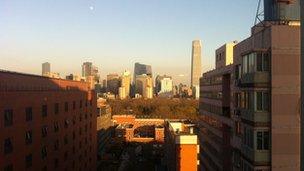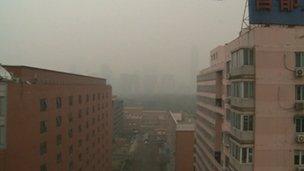China's pollution, a toxic issue
- Published
- comments

The smog over Beijing has gone - for now
Thankfully the foul smog that has hung over Beijing for several days has cleared.
But what it has left behind is a sense, as clear as the sky was now blue, that the capital's pollution is far more than just an environmental problem, it is becoming a political issue too.
Put frankly many people simply don't believe official air quality figures.
So northern China's recent awful air quality has left its local government authorities with some serious credibility problems.
Take a look at the photo above. I took it this afternoon from my window.
There, in all its glory, is Beijing's Central Business District, the way it can be appreciated on a clear day.

Where have all the skyscrapers gone?
Now compare this shot, taken from the video I posted yesterday, of exactly the same view.
Yuk. The difference is shocking. You can see more on the video on my blog yesterday if you like.
So when Beijing's environmental bureau was insisting that the pollution was 'light' yesterday you can see why many ordinary Beijingers simply didn't believe it.
Here's a taste of the comments people have been posting on China's microblogs about the pollution. "Do they want to poison the country's people to death?" asked one.
Another called Steedeets wrote: "After 8pm, fog has locked up Beijing's east 5th ring rd. I can't see further than 1 metre! All visions are just scary! No picture can capture this reality, because all pictures will simply be white! There is strong smoke flavour in the air, can hardly breath! What kind of city is this? What kind of horror is this?"
Wang-Ganggang added: "The polluted air hurts the health of Beijing people, the statistics released by the Environment Protection Bureau... hurt the feelings of Beijing people."
And Spatzi said: "It's true that the more corrupt the place is the worse its environment."
The official pollution advice suggested the levels on Monday and Tuesday were acceptable. But the alternative readings posted on the internet by the US embassy, from its own monitoring equipment, indicated it was "very unhealthy" and vulnerable groups, including children and the elderly, should not exercise outside.
The US readings reflect stricter pollution standards called PM 2.5 measuring particles less than 2.5 microns wide.
These tiny particles connected with car emissions, power stations and factories can have serious health effects as they travel deep into your lungs.
Beijing's authorities take PM 2.5 readings but don't release them. They only release larger PM 10.0 measurements.
They say the US readings, taken at just one site in the city are unrepresentative. But with the haze so visible in the air the city authorities didn't sound credible.
Instead people in Beijing have been rushing out to buy masks and air purifiers for their homes. China's biggest online marketplace, Taobao.com, is reported to have sold 20,000 face masks in Beijing recently.
Under the clear blue sky today the Global Times, a government-controlled paper from the Communist Party's People's Daily group warned that "a heated debate on whether air pollution has gone 'out of control' is now running wild".
The paper pointed out that despite official insistence that the situation is not dire, "online opinion prefers to trust data released by the US Embassy in Beijing".
And its editorial cautioned that the debate "is a matter of government credibility. The government can easily lose this argument".
Many Chinese people are already sceptical about a lot of what they hear from the Communist Party and the bureaucrats who run China. From tainted baby milk to dangerous pesticides and additives in food there have been many recent health scares.
The safety of the food people eat and the air they breathe are everyday concerns for millions of people. So there is likely to be even deeper cynicism if the smog is thick and officials are insisting things are fine.
What is interesting is how this issue is a sign of the way China's political landscape is shifting. As people are getting richer, their lifestyles are improving, and their quality of life is increasingly important to them.
So as China's middle classes expand they are getting more assertive about the state of their environment, the quality of their healthcare and schools, and the transparency of their government.
In that - still limited - sense people are becoming more politically aware and active.
And a final observation is that the driving force beneath this is the internet and the access it is providing to information.
What is interesting in this instance is that it is the US Embassy providing that information.
Under President Barack Obama, the US has been looking for ways to use the internet to reach out directly to the hundreds of millions of Chinese people who use the internet, bypassing China's government.
A US embassy cable from 2009 released by Wikileaks said that China's foreign ministry had demanded the US stop publishing its embassy air-quality readings because they were "confusing" and "insulting" and could have "social consequences". The embassy refused.